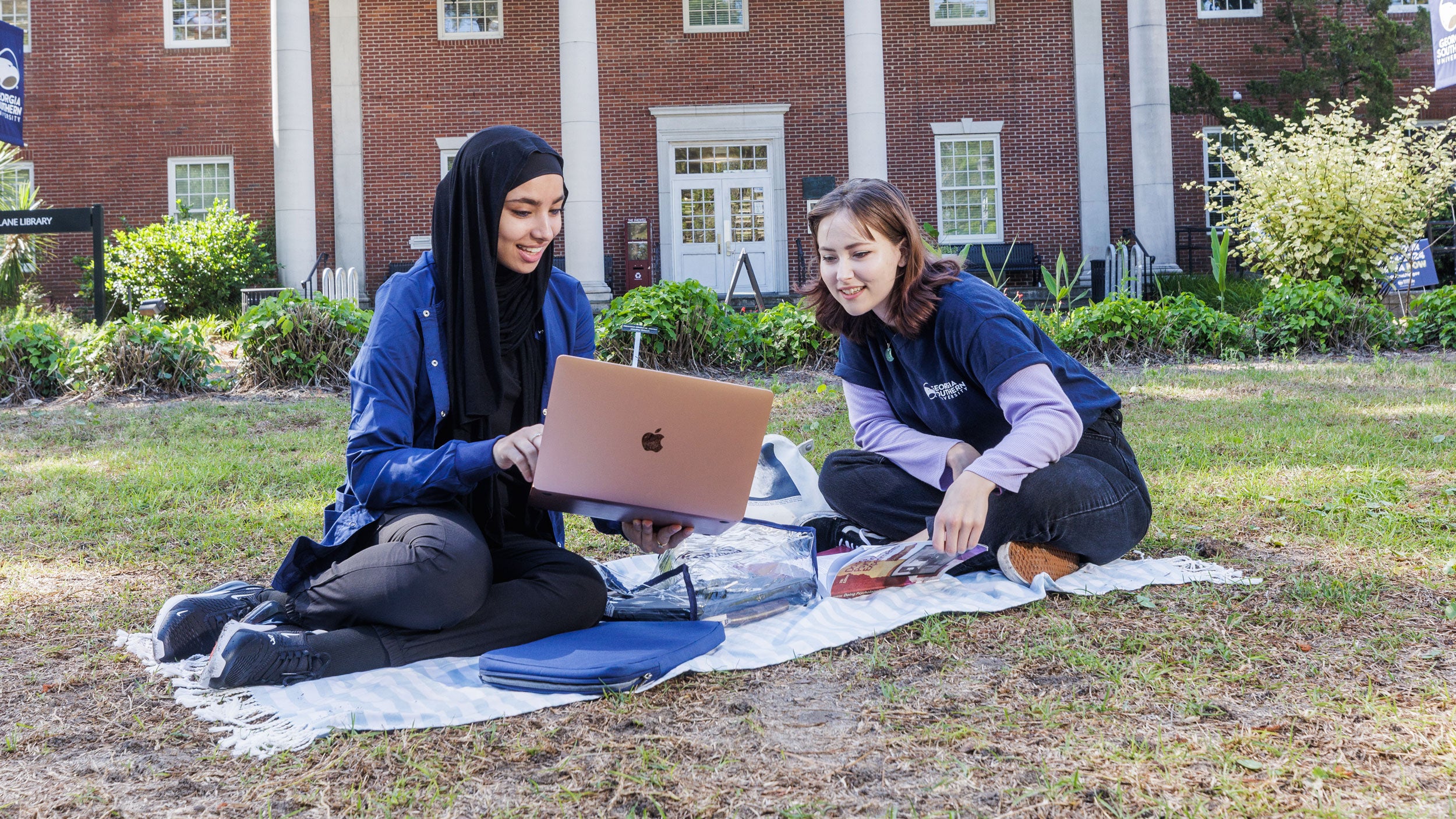Dive into the language and culture of one of the world’s most influential nations, developing your understanding of Japan’s rich cultural heritage and its modern global influence and gaining valuable skills for careers and advanced studies in fields like international relations, business, and technology.
Locations
- Statesboro Campus
- Online
Why Get your Bachelor of Arts in Japanese at Georgia Southern?
Majoring in Japanese at Georgia Southern offers a unique opportunity to immerse yourself in the language and culture of one of the world’s most influential nations.
Our program goes beyond mere language acquisition, providing a deep understanding of Japan’s rich cultural heritage, literature, and contemporary global impact. Through courses exploring Japanese literature, business practices, and pop culture, you’ll develop essential language skills and cultural competencies highly valued in international business, education, and government.
With an emphasis on conversational fluency and cultural insight, the Japanese major equips you with the tools to thrive in our increasingly interconnected world.
Ready to Apply?
What Can You Do With a Bachelor’s Degree in Japanese?
Sharpening your proficiency in Japanese language, culture, and history prepares you for roles like translator, foreign service officer, intelligence analyst, or international marketing specialist.
Our Japanese program’s holistic approach helps you build a solid foundation for advanced studies in international relations, political science, or global commerce. This comprehensive education will give you a valuable edge in this increasingly interconnected world.
Where our graduates work:
- International Aid
- Education and Research
- Government
- Airline Industry
- Human Resources
- International Business
What our graduates do:
- Translator
- Interpreter
- Intelligence Analyst
- Educator
- Politics
- International Aid
- International Business
What You’ll Learn
As a Japanese Major, you’ll develop proficiency in the language while gaining a comprehensive understanding of Japan’s culture, history, and literary traditions.
The Georgia Southern Japanese curriculum covers essential language skills, including reading, writing, speaking, and listening, with courses ranging from conversational practice to advanced studies in Japanese literature and business. You’ll also get to explore cultural topics such as traditional customs, contemporary pop culture, and historical movements, allowing you to appreciate the depth and diversity of Japanese society.
This well-rounded approach prepares you for global careers in fields like international relations, business, education, and cultural exchange.
Study Abroad in Japan
With a population of nearly 1.5 million, Kyoto is the former capital of Japan. Kyoto is a city full of history, culture, art and nature with many famous tourist attractions and recreational activities. Natives of the city take pride in their customs and traditions, which come alive especially on their many holidays and festivals.
Kyoto International Academy, Georgia Southern’s partner language school, was established in 1987 and is located in the northern part of Kyoto in a quiet residential area where many students live. The school was given a Class A superior rating for its traditional and academic achievements by the Osaka Immigration Bureau.
Japanese Curriculum
Foundational Japanese Courses
- Elementary Japanese I
Introduction to listening, speaking, reading, and writing in Japanese and to the culture of Japanese-speaking regions. - Elementary Japanese II
Continued listening, speaking, reading, and writing in Japanese with further study of culture of Japanese- speaking regions. - Intermediate Japanese I
Building upon communication skills (understanding, speaking, reading, and writing Japanese) and cultural understanding, developed at the elementary level.
Intermediate Japanese II
Continued focus on communication skills and cultural understanding.
Additional Japanese Courses
- Business Japanese
Introduction to the language and practice of business conventions in Japan. Development of all five language skills: listening, speaking, reading, writing, and culture. - Japanese Conversation
Continued development of all five competencies: listening, speaking, reading, writing, and culture, with special emphasis on conversational skill. - Japanese Literature I
A survey of major authors and movements in Japanese literature from the Meiji period to the present, including women in literature and the relations to cultural trends and other arts, such as painting and film. - Japanese Culture I
Development of the Japanese language with a special emphasis on its culture. Development of all five language skills: listening, speaking, reading, writing, and culture. - Japanese Culture II
Introduction to the Japanese culture, values, society, customs, and the language for American students. - Japanese Literature II
Continued development of all five competencies: listening, speaking, reading, writing, and culture. A survey of Japanese literature until the end of the Edo period (-1868). - Reading Japanese
Introduction to the Japanese language with an emphasis on reading skills. Continued development of all five skills: listening, speaking, reading, writing, and culture. - Selected Topics in Japanese
Study of a topic in Japanese literature, culture, society, thought, or language not included in the regular offering. Continued development of all five language competencies (listening, speaking, reading, writing, and culture). May be repeated for credit provided a new topic is studied.- Grammar review
- Grammar and composition
- Critical reading and writing
- Current issues/events
Minor in Japanese
A minor in Japanese rounds out your education, helping you communicate intra-, inter- and trans-culturally. You’ll be able to adapt to different environments, be more sensitive to diversity and think more critically.
Take Action
Follow these steps to complete the Georgia Southern application:
- Create an application account.
- Complete our online application using the PIN you received after creating your application account.
- Once complete, pay the $30 application fee or upload a valid fee waiver. Previous Georgia Southern applicants and dual enrollment students do not need to pay the fee.
You can check your application status at My.GeorgiaSouthern.edu/admissions three days after completing your application. This page contains live information about your admission status, including a checklist of missing documents we need to make a decision.
Apply to the Master's program Transfer to Georgia SouthernThe following are suggestions to help students and advisors know which level of a FL course the student should register for initially (students should compare their abilities with the descriptions below and plan to sign up for the course that most closely matches their proficiency). Students should send an email to languages@georgiasouthern.edu to request an appointment for a placement interview and to obtain override authorization into the course.
Note that, because courses are sequenced, it is a huge advantage to students to take a FL class their very first semester or as soon as possible.
Choose…
- FL 1001: If you have no previous language-learning experience all the way to the ability to say and write a few words/phrases.
- FL 1002: If you can say and write simple sentences confidently in the present tense; can ask and answer simple questions; have an awareness of past-tense verbs.
- FL 2001: If you can speak and write in the present tense with relative ease, have an awareness of past-tense narration and can utilize some past-tense verbs accurately; can ask and answer questions related to daily life; can manage a simple conversation, albeit with difficulty.
- FL 2002: If you can speak in the present tense with ease and can successfully attempt some past-tense narration (tell a story in the past); can confidently ask and answer questions related to daily life; can conduct a simple conversation with relative ease.
- FL 3000 level: If you can narrate completely (beginning, middle, end) an experience in the past, although perhaps with grammatical errors and lexical gaps.
Note: You may place out of 1001, 1002, 1060, 2001, 2002, and/or 2060 courses and still get credit for them. If you have taken an offered language previously, you should attempt to take the course that best fits your current abilities—you do not need to and should not start in 1001, if you don’t need to. If you take a higher course and receive a C or better (must be a Georgia Southern course; cannot be an eCore or transfer course from another institution or AP/IB/CLEP credit), you may petition to get credit for the lower course(s) through Credit by Proficiency. For more information about the process click here and/or talk to Department of World Languages and Cultures staff for more information.
- Japanese Club
Japanese Club on the Statesboro campus hosts events such as Japanese conversation hour, movie night, karaoke competition, Setsubun or bean throwing event, calligraphy workshop, origami workshop, Japanese tea hour, and more!
Japanese Pop Culture Appreciation Club
Based on the Armstrong campus, the purpose of the club is to appreciate all forms of Japanese culture including anime, manga, music, food, film, fashion, religion, politics, and video games. With an active discord server, there is no need to meet up in person to keep up with all the latest goings-on in the club.

Take the Next Step
Ready to dive into the language and culture of one of the world’s most influential nations? Learn more about studying Japanese at Georgia Southern University.
Contact Us
Department of World Languages and Cultures
P.O. Box 8081
Statesboro, GA 30460-8081
Phone: 912-478-5281
languages@georgiasouthern.edu
Dr. Noriko Mori-Kolbe
Senior Lecturer of Japanese
Interdisciplinary Academic Building #2061
Email: nkolbe@georgiasouthern.edu
Phone: 912-478-0241




